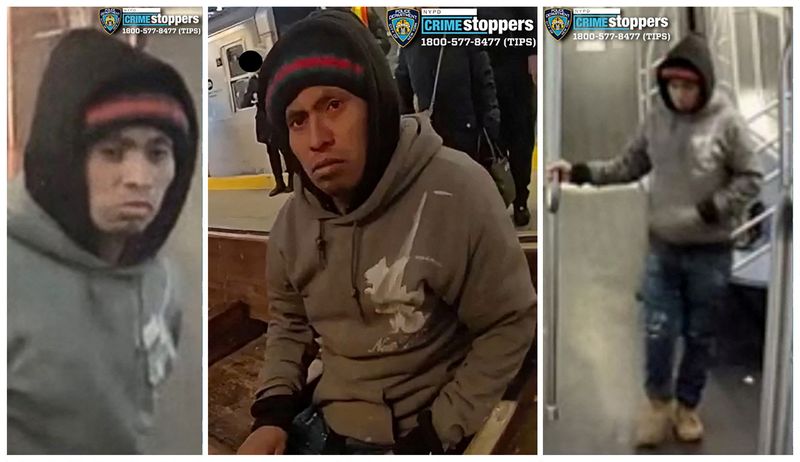By Jonathan Allen
NEW YORK (Reuters) -The man accused of killing a woman sleeping on a New York City subway car by setting her on fire after what prosecutors say was a night of heavy drinking pleaded not guilty to charges of murder and arson at a court hearing on Tuesday.
A grand jury has indicted Sebastian Zapeta, 33, of one count of first-degree murder, three counts of second-degree murder and one count of first-degree arson in the first degree for the killing of Debrina Kawam, 57.
After his arrest, Zapeta told detectives that he often drinks heavily to the point of blacking out, and that he had done so just before Kawam was killed, according to a court filing by prosecutors on Tuesday.
Crime remains relatively rare on the city's subway, one of the oldest and largest transit systems in the world, but the New York Police Department acknowledged this week that attacks like Kawam's violent killing can terrify New Yorkers.
Many were horrified by a brief video of Kawam engulfed in flames near the open doors of a train car, recorded by a bystander on the platform.
According to the police account, Zapeta used a lighter to ignite the clothes of Kawam, who appeared to be sleeping on a seat in a stationary F train car at the Coney Island-Stillwell Avenue subway station at about 7:30 a.m. on Dec. 22.
He then used a shirt to fan the fire, the police complaint said.
Kawam was pronounced dead at the scene after the fire was extinguished. The city's medical examiner said the cause of death was smoke inhalation and thermal injuries. It took more than a week to identify her using fingerprint analysis.
Zapeta is a Guatemalan citizen, federal officials have said, who has been living in a homeless shelter in Brooklyn and working as a roofer in the neighboring borough of Queens, according to the New York Police Department.
When police detectives showed Zapeta video of Kawam being set on fire, he told them that it was him in the video, but he did not recognize Kawam nor remembered it happening, according to the court filing by the Brooklyn district attorney's office.
"Oh, damn, that's me," he said as he watched the video in the police interview, which was translated from Spanish in the court filing. "I really don't remember." He said he was "very sorry" for Kawam.
He said he had been drinking beers since the evening before, and recalled waking up on the F train.
"Sometimes when I drink and erase the memory and I don't know," he said. "When I wake up, I'm already in the house already sleeping. I wake up when I'm already at home. Or there are times when I wake up and I'm already at the train station, or on the train."
He was arraigned in the Kings Supreme Court in Brooklyn in brief hearing before Judge Danny Chun on Tuesday morning, appearing in orange jail clothes with his hands cuffed behind his back and his public defender and a Spanish interpreter at his side. His next court hearing is set for March 12,
Kawam was from Toms River, a coastal town in New Jersey, and, like Zapeta, had also spent time in the city's homeless shelter system, according to Mayor Eric Adams.
About 4 million trips are taken each weekday on the city's subway, where serious crime, predominantly thefts, declined for a second year in a row in 2024, down 5.4% from the previous year, the New York Police Department said.
Killings have increased, however. As of November, there had been nine homicides reported on the subway in 2024, compared to five in the same period in 2023, according to police data.
Last month, a jury acquitted Daniel Penny of criminally negligent homicide in the death of Jordan Neely, a homeless former Michael Jackson impersonator, on the city's subway. Neely had been shouting angrily at passengers on a subway train when Penny grabbed him from behind and restrained him in a chokehold for several minutes.
New York Police Commissioner Jessica Tisch said on Monday she was sending more officers to patrol the subway in response to Kawam's killing and other "terrifying random acts of violence."

"Declining crime numbers are significant, but we still must do more, because people don't feel safe in our subways," Tisch said.
If convicted on any of the charges, Zapeta faces a maximum sentence of life in prison without the possibility of parole. The U.S. Department of Homeland Security has said that Zapeta had entered the country unlawfully, and would eventually seek to deport him.